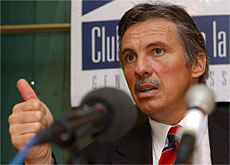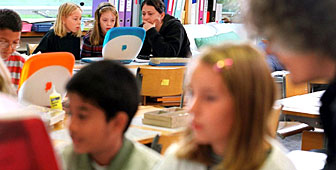Swiss seek to bridge global information gap

Switzerland has outlined its objectives for the World Summit on the Information Society, which will start in Geneva later this year.
The Swiss government is to host the first phase of the summit in December, while a second round of high-level talks are slated to take place in Tunisia in 2005.
The Swiss Federal Communications Office has called on the public and private sectors to work together to provide equal access to information for all.
According to the Office’s director, Marc Furrer, Switzerland hopes the 2003 summit will result in concrete measures to bridge the growing divide between information “haves and have-nots”.
“Over half of the people in the world have never used a telephone,” said Furrer. “And it’s clear that those people who do not have access to information networks do not have an economic future.”
His comments came following two weeks of preparatory talks in Geneva, where around 1,500 delegates from 100 countries have been discussing how governments, non-governmental organisations and the private sector can work together to achieve these goals.
“We need civil society and non-governmental organisations to express the needs and feelings of citizens,” said Furrer.
“The private sector will build and deliver services and the role of governments is to provide frameworks… to create win-win situations in the field of information and communication technologies.”
Digital divide
According to the United Nations’ International Telecommunication Union (ITU), which is organising both phases of the summit, the world is in the midst of perhaps “the greatest revolution humanity has ever experienced”.
The rapid evolution of the global information society is having a profound impact on how information is distributed and received, on the way humans communicate and on how business is conducted. But it is also leaving huge sections of the world population behind.
People from developing nations and transition economies make up the largest portion of those who do not have access to information and the ITU estimates that worldwide, only one out of every 100 people has a telephone line.
Meanwhile, the division between those with and without Internet access continues to increase. “In Bangladesh, the cost of subscribing to an Internet service provider is equal to around one month’s average wages,” said Furrer. “Here in Switzerland, it’s much, much less.”
Furrer believes greater emphasis needs to be placed on traditional forms of media, such as radio, as a means of disseminating information.
“Radio is a mirror of the cultural diversity and political identity of communities,” he told swissinfo.
“It’s bad if a region doesn’t have its own radio station and governments should be encouraged to distribute frequencies more fairly, rather than hold a state-owned monopoly.
“Another example of a necessary benchmark would be to establish a telecentre in every village by 2008.”
Swiss leadership
As the host country of the 2003 gathering, Furrer believes Switzerland must play a significant role in leading the world summit process and in promoting these types of tangible solutions.
“Switzerland must take part in pushing this process towards success, which will mean coming up with guidelines for concrete action,” he said.
“We feel responsible for the outcome of this summit and it will be up to us to integrate the public and private sectors into the talks.”
According to Furrer, this will involve organising a series of parallel events and discussions, which will take place during the summit and whose findings will be examined at the political level.
So far, Furrer believes that significant progress has been made in preparing for the summit, however, he cautions that delegates still have a great deal of ground to cover before December.
“The whole process is still moving quite slowly,” he told swissinfo. “We really need to get down to discussing the points we disagree on, such as freedom of expression or copyright laws, and we’re not quite there yet.”
swissinfo, Anna Nelson in Geneva
The first phase of the World Summit on the Information Society will be held in Geneva from December 10-12.
Its aim is to come up with an action plan to ensure equal access to information for all people.
The summit will bring representatives from governments, civil society and the private sector together to discuss ways to bridge the growing digital divide.
It marks the first-ever United Nations summit to be hosted by Switzerland, which joined the world body last year.

In compliance with the JTI standards
More: SWI swissinfo.ch certified by the Journalism Trust Initiative

You can find an overview of ongoing debates with our journalists here. Please join us!
If you want to start a conversation about a topic raised in this article or want to report factual errors, email us at english@swissinfo.ch.